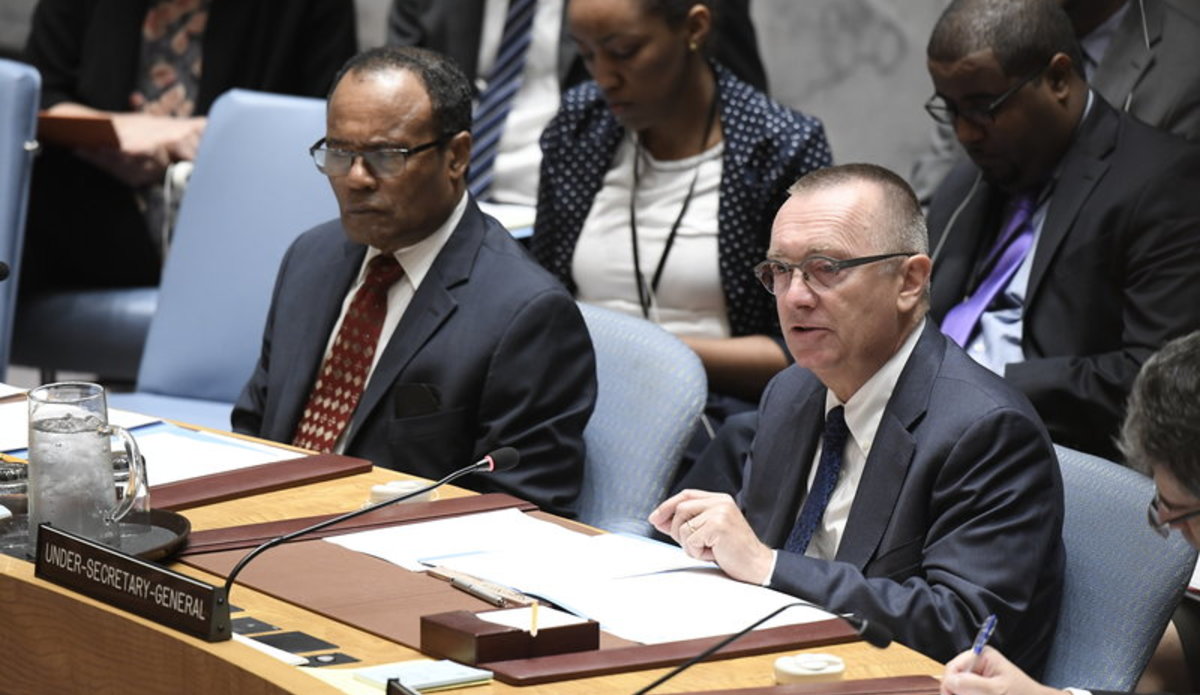Mr. President,
Members of the Security Council,
According to the official news agency of the Democratic People’s Republic of Korea (DPRK) and various governmental sources, at approximately 02:48 am local time on 29 November 2017, the DPRK launched a ballistic missile, which it termed an “intercontinental ballistic rocket Hwasong-15”. The missile was reportedly launched from an area north of Pyongyang, covering approximately 950 km and reaching an apogee of around 4,500 km, before impacting into the sea in Japan’s exclusive economic zone.
These parameters indicate that, if flown on a standard trajectory, the missile as configured would have a range in excess of 13,000 km. This is the DPRK’s third test of a ballistic missile of apparent intercontinental range in less than six months and its twentieth ballistic missile launch this year. The DPRK again did not issue any airspace or maritime safety notifications.
The official media claimed the DPRK was now – quote – “capable of striking the whole mainland of the U.S.” – end quote. The official media also claimed that the DPRK had – again I quote - “finally realized the great historic cause of completing the state nuclear force, the cause of building a rocket power” end quote.
Mr. President, this is the thirteenth time the Council has met to discuss the DPRK in 2017. The DPRK’s repeated nuclear and missile tests over the past two years have created great tension on the Korean Peninsula and beyond. This dynamic must be reversed. The solution can only be political.
Given the grave risks associated with any military confrontation, in exercise of its primary responsibility the Security Council needs to do all it can to prevent an escalation. Unity in the Security Council is critical. Security Council unity also creates an opportunity for sustained diplomatic engagement – an opportunity that must be seized in these dangerous times to seek off-ramps and work to create conditions for negotiations.
Mr. President, the Secretary-General strongly condemns this latest launch. This is a clear violation of Security Council resolutions and shows complete disregard for the united view of the international community. The Secretary-General urges the DPRK to desist from taking any further destabilising steps. The Secretary-General reaffirms his commitment to working with all parties to reduce tensions. I called a meeting this morning with the DPRK Permanent Representative to deliver the Secretary-General’s message in person. During the meeting, I stressed that there is nothing more dangerous to peace and security in the world than what is happening now on the Korean Peninsula.
Mr. President, the Secretary-General discussed the situation on the Korean Peninsula with all concerned parties in the margins of the high-level week of the General Assembly. During the Secretary-General’s meeting with Mr. Ri Yong Ho, Minister for Foreign Affairs of the DPRK on 23 September, he expressed concern over the tensions on the Korean Peninsula and appealed for de-escalation and full implementation of relevant Security Council resolutions. The Secretary-General emphasized the need for a political solution.
Mr. President, amidst the heightened tensions, the United Nations and other humanitarian actors play a critical role in saving the lives of the most vulnerable in the DPRK. The needs are increasing and food security remains a critical concern for 70 per cent of the population. Member States are again reminded of the need to support the life-saving activities carried out by humanitarian organisations in the country.
We will continue to closely follow the developments and remain in close coordination with the concerned international organisations, and with Members of this Council, as well as other governments concerned.
Thank you.

